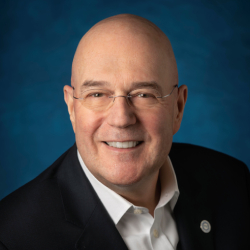
Larry Bingaman
Chair Emeritus
Why do we need a new way of doing business?
There is a serious income disparity in our country that will have dire consequences if not addressed. It is simply not sustainable to have an economy where such a large portion of the population is left behind. Our country’s GDP may be on the increase, and the Greater New Haven region may be recognized as a bright spot in the state’s economy, but that prosperity means little if it does not benefit our entire community.
Conscious Capitalism is the promise of both economic and social success. By reorienting business to be conscious and do good, we can lead successful companies while standing together in support of the social, environmental and financial well-being of all people. For example, conscious, inclusive business has the power to bring economic prosperity to families in struggling communities, giving them a path out of poverty and into success as our future customers or even owners of their own companies. And, conscious, inclusive business can bring opportunity to people, providing them with access to jobs and education as well as promote a sustainable relationship with the environment and improve public health. Conscious, inclusive business can do all of these things, and it has been repeatedly shown that customers and employees respond positively to this commitment to a higher purpose, resulting in significant benefits to the bottom line. Conscious Capitalism benefits our businesses just as much as it benefits our society.
Give us an idea of how you have helped make the world a better place?
Since taking the helm at the Regional Water Authority (RWA), I have worked to reorient the business into a force for positive change. In addition to our commitment to providing a high-quality, reliable and affordable water supply to some 430,000 people, we now offer the services of our laboratory to test the water quality of utilities around the country, helping to bring potable tap water to more people. We have also increased our environmental protection efforts. Recently we hired our first-ever Invasive Species Management Technician, who works with RWA employees and environmental research organizations to develop and execute strategies for eliminating the harmful presence of invasive species in our state.
I also believe that commitment to one’s community is a vital part of business and of life. To that end, I volunteer my time with a number of community organizations. In addition to founding Connecticut’s chapter of Conscious Capitalism, I am a founding partner for New Haven’s Social Venture Partners. As a firm believer in the value of education, I have worked closely with Gateway Community College and Southern Connecticut State University. These two important community partners worked closely with the RWA to develop a first-of-its-kind Public Utility Management Degree program, which is training the next generation of utility workers. Most recently, I was proud to be named the 2019 recipient of the School for Ethical Education’s John Winthrop Wright Ethics in Action Award and be given the opportunity to speak before a group of young people about the importance of ethics in our personal and professional lives.
What does Conscious Capitalism mean to you?
At a time when corporate scandals have triggered a broad discussion on the role of business in society, I believe the Conscious Capitalism philosophy couldn’t be more essential and relevant.
We need more businesses to help solve the major challenges we face around the world. I believe purpose-driven companies are ideally placed to contribute to positive social, environmental and financial impacts because of their commitment to a higher purpose beyond simply maximizing profit.
For that reason, it has been my personal mission to create positive change in our region and to start the Conscious Capitalism conversation among other state business and community leaders as a way to influence business for the better. I want to grow awareness of conscious business practices to help them become the norm rather than the exception.
